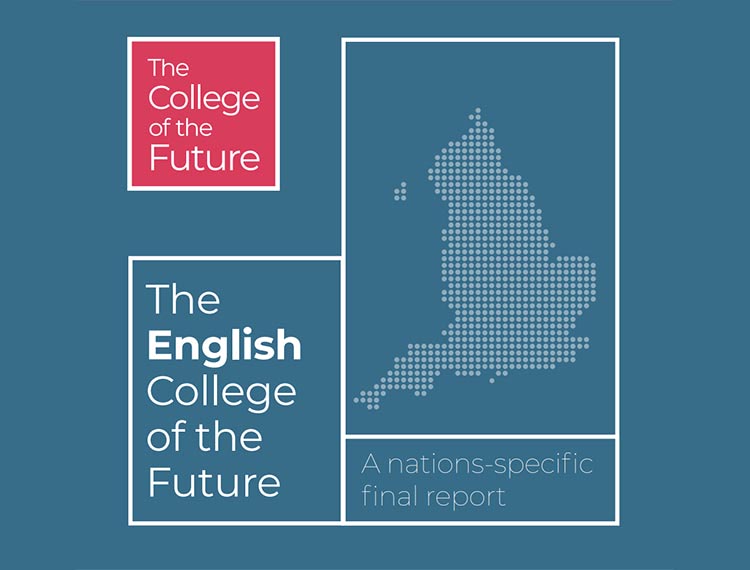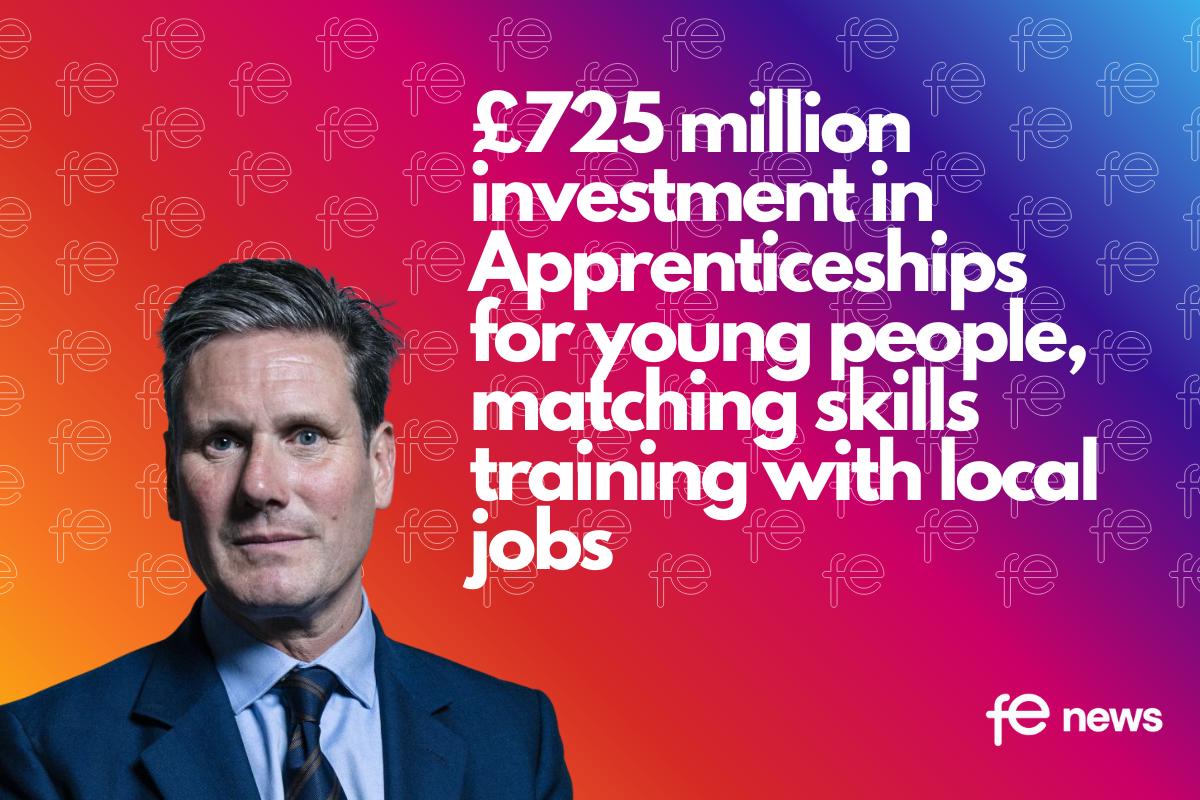The English College of the Future: Overhaul the post-16 education system through the upcoming FE White Paper to secure a better future for young people, adults and businesses

As more evidence of the biting pandemic effects on young people and adults comes to light, the new report from the Independent Commission on the College of the Future (@CollegeComm) calls for colleges and skills to be made central to COVID recovery plans in England.
Last week, the latest unemployment rate revealed the number of people out of work was at its highest since 2016 – at 4.8%, with thousands of others worried about losing their jobs in the coming months.
Currently, the post-16 education and skills system is not set up to empower colleges to offer the full range of opportunities needed for people to reach their potential, especially for the 50% that do not go to university. Nor does the system enable colleges to best meet the needs of businesses facing enormous change and challenges.
Today’s report, The English College of the Future, sets out Eleven recommendations, that if implemented through the government’s upcoming FE White paper, will put employer voice at the heart of the system to help people find the right courses or qualifications to transform their lives.
This requires sufficient funding to support upskilling and retraining as jobs change. Those made redundant will gain skills for good jobs, learning will be opened up to people on benefits and those in insecure work, and businesses will have advice and support to find and develop the skilled people they need as we recover from the ongoing pandemic.
11 Recommendations for a nation-specific post 16 education and skills strategy |
|
|
Recommendation 1: A national strategy for education and skills to support economic growth, industrial change and lifelong learning Government must develop a coherent post 16 education and skills strategy, with alignment to its industrial strategy – redressing nugatory competition that exists across the system, and setting out a coordinated approach to an expanded lifelong education service. |
|
|
Recommendation 2: College network strategies to meet local priorities across the tertiary education system Government should introduce a legal duty on colleges to establish networks across appropriate economic geographies. Government should set out the principles it seeks to achieve through college networks (including across population footprint and travel to work/ learn analysis), and develop a framework for their establishment – and colleges should then be invited to come forward with their models as to how these principles can be achieved in their particular contexts, for DFE approval. Networks should be introduced in a staged approach – with the third wave to be completed by 2023/ 24. |
|
|
Recommendation 3: Colleges as anchor institutions within the wider local and regional ecosystem The role that colleges play as place-making institutions at the heart of their communities needs to become a core element of their strategic remit. New college network strategies will help to build stronger partnerships with other public and private agencies and civic partners and their wider investment plans locally and regionally. |
|
|
Recommendation 4: A statutory right to lifelong learning Government must set out a new statutory right to lifelong learning. This means that lifelong education must be meaningfully accessible for people, and there is significant work required to redress deficiencies in the existing student maintenance system. |
|
|
Recommendation 5: Skills guarantee for a post-COVID economy and future labour market changes The statutory right to lifelong learning must be augmented through targeted investment to upskill, retrain and reskill to help individuals find work in higher demand priority sectors, to supplement previous qualifications and to help them maintain relevant skills. A Skills Guarantee would provide free training to upskill employees at all levels reflecting national and regional priorities, with maximum flexibility to meet sector needs and to enable upskilling of employees. |
|
|
Recommendation 6: A new strategic partnership with employers The college system needs a new, strategic partnership with employers, nationally and regionally/ locally at the network level. This means ensuring fundamentally that employers are recognised – and understand themselves to be – a crucial part of the education and skills ecosystem. This must see the voice of employers reflected centrally in the development of national and network strategies. There is a challenge here, given the insufficient sector-based employer infrastructure – and this too requires ongoing focus. |
|
|
Recommendation 7: A new strategic support service to employers College networks must work to build on existing natural specialisms to develop ‘employer hubs’. Building on and drawing from Institutes of Technology (IoTs) where they exist/ are being developed, employer hubs would become a key strategic element of the college network offer – which must be reflected in accountability structures. These must be adequately funded as part of college network grant funding settlements. |
|
|
Recommendation 8: Stable funding and accountability frameworks for colleges College networks must be empowered to take a long-term systems focus, which is enabled by a shift towards three-year, grant funding settlements based on outcome agreements agreed at the network level – reflecting the role that the college network will collectively play across people, productivity and place. |
|
|
Recommendation 9: A strategic relationship with government and simplified processes Government must work to develop simplified oversight – driving efficiency, engendering greater trust and enabling better strategic coordination. Long-term, this should see the establishment of a single post-16 education oversight and funding body ensuring a coherent lifelong education service, and addressing nugatory competition between colleges and with other education providers. |
|
|
Recommendation 10: Diverse and representative systems leaders Systems leadership is crucial to the successful delivery of the college system’s renewal in England. The shift in funding, governance and accountability is a key element of this – but the leadership behaviours and skills are just as vital. There is a real value in ongoing engagement with leaders across the four nations, and we recommend ongoing leadership development and amplification of systems leadership through the work of the Four Nations College Alliance. |
|
|
Recommendation 11: An ambitious future college workforce strategy Pay has declined significantly over the past decade, and is a major strategic issue. We propose a new starting salary of £30,000 for teaching staff in colleges, and urgent work undertaken to prioritise increased investment in the workforce, across remuneration and investment in CPD. |
Central recommendations for the anticipated FE White Paper
To create the post-16 education and skills system needed for the future the FE White Paper should include:
- Introducing a legal duty on colleges to establish networks across appropriate economic geographies – which must be matched by a duty on all other post-16 education providers – to collaborate in the interests of students, communities and the economy.
- Forming a cross-departmental ministerial taskforce/ body to oversee a new UK Government 10-year strategy for education and skills to drive the industrial strategy and other priorities, with DFE, BEIS, DWP, MHCLG and others represented, together with employers and other key stakeholders.
- Funding colleges to deliver specialised and targeted business support, creating employer “hubs” in key sectors and occupational pathways, especially in digital, construction, engineering, and health and social care. This includes a new, refreshed genuine strategic partnership between colleges and SMEs to get people back into secure employment quickly and drive innovation.
- Creating a statutory right to lifelong learning by making lifelong learning accessible and financially viable to all through offering equal loans and grants across further education and higher education so that everyone can access the training they need, no matter where they come from, their circumstance or their background.
- Investing in colleges through three-year grant settlements to give colleges the confidence and funding to deliver strategically for people, productivity and place in the economic rebuild.
Sector Response
Amanda Melton CBE, Principal and Chief Executive of Nelson and Colne College Group, and member of the Independent Commission on the College of the Future, said:
“Colleges provide skills and training to local people, employers and communities, often in a challenging and continually changing policy and fiscal environment.
“It is essential that the government invests in colleges as essential public assets, and builds a new relationship as strategic and trusted partners, securing relevant high quality learning over all our lives, building the skills England needs in the short and longer term.
“The anticipated FE White Paper will be a vehicle to drive the fundamental systems change needed. But colleges should take a lead role in delivering the transformation required, in the context of the vision for the future and outlined Government reforms.
“This report is a rallying call for colleges. I know we share a collective ambition for the expanded role colleges can and must play in our society and economy. This will require real cultural shifts within the college sector to achieve the Commission’s vision for a collaborative college sector for the future. Colleges will then successfully adopt their lead role as lynchpin of a coherent, connected education and skills system that delivers for our communities and economy.”
 Matthew Fell, CBI Chief UK Policy Director and member of the Independent Commission on the College of the Future, said:
Matthew Fell, CBI Chief UK Policy Director and member of the Independent Commission on the College of the Future, said:
“With nine in ten workers needing some form of reskilling by 2030, colleges will play a crucial role in delivering the skills vital for firms and individuals to succeed.
“To address skills gaps now and in the future, historic underfunding of the FE sector must end.
“The English College of the Future highlights how giving colleges the resource and flexibility to partner with business will help close skills gaps, boost people’s life chances and make our economy more competitive.”
Paul Nowak, TUC Deputy General Secretary and member of the Independent Commission on the College of the Future, said:
“This report sets out a comprehensive vision for how colleges in England can support a fairer economic recovery and increase access to learning and skills.
“A new collaborative approach that draws on the voices of learners, employers and unions will benefit new learners, businesses, local economies – and wider society. But progress will depend on a better deal for the college workforce. College staff in England have suffered years of cuts, redundancies, limited pay rises and casualisation.
“We urgently need government action to better recognise and reward the efforts of the whole staff team, listen to their ideas and invest in their development.”
Nora Senior CBE, Executive Chair, UK Regions & Ireland, Weber Shandwick, and member of the Independent Commission on the College of the Future, said:
“Many employers work closely with colleges every day. They trust them to deliver the skills businesses need and to know what is best for the communities we are situated in. However, the partnership needs to transform from being transactional to strategic.
“What we need now is for the UK government to give English colleges the trust they need and deserve to deliver the skills we need in this uncertain time, and in the future. This means freeing them up from bureaucracy and empowering them to be strategic and agile to labour market needs. The publication of this report is opportune given the challenges faced by businesses in the pandemic. The Commission sets out a roadmap for a much closer working relationship between business and colleges. Business needs to get behind this new approach and make it a two way street.”
 David Hughes, Chief Executive of the Association of Colleges, said:
David Hughes, Chief Executive of the Association of Colleges, said:
“This report is a must-read for everyone involved in post-16 education and training. The Commission has worked so hard to reach a consensus with employers, government, students and colleges about the system needed to get the most out of colleges over the coming years.
“Colleges make an enormous impact now, but with the recommendations in this report implemented, and with the right investment, they can do so much more for people, places and productivity.”
 Jane Hickie, Managing Director of the Association of Employment and Learning Providers (AELP) said:
Jane Hickie, Managing Director of the Association of Employment and Learning Providers (AELP) said:
“A great deal of collaboration already goes on at local level and long may it continue. What the FE and skills system must be about is employer and learner choice and the statute book has no place in trying to restrict that choice. University choices aren’t restricted and nearly all parents have a choice over schools within their catchment areas. Therefore why should local employers and learners be treated any differently for FE and skills?
“We know why the report refers to ‘nugatory competition’ but the meaning of nugatory is worthless or unimportant. Policymakers should remember however that independent training providers don’t receive grant funding and only get paid for what they deliver, and they deliver what their employers and learners believe is the best provision for them locally. There are 10 years of successive government and independent surveys that show they are extremely happy with the customised service they are receiving. It would be a very backward step if the FE white paper and legislation started to interfere in the choices that employers and learners can make.”
Robin Ghurbhurun, managing director of FE at Jisc and expert panel member, said:
“Our FE sector needs greater support to deliver education that reflects the evolution of the workplace and the emerging skills requirements of our technology-driven age. Colleges have long been under immense financial strain. Strategic funding is now vital to deliver a post-COVID education model that combines face-to-face and online teaching and learning. As the UK’s digital body for lifelong learning, Jisc sees technology-enabled education as fundamental to delivering teaching and learning that is flexible, innovative, and accessible to individual needs. We need to nurture a system in which teaching staff are digitally empowered, and where online content can support the skills needed for the national economy to build back better.”
 David Gallagher, CEO at NCFE, said:
David Gallagher, CEO at NCFE, said:
“Positively, the report highlights a new and much clearer vision for colleges at the heart of their communities and playing a central role in boosting productivity. The emerging picture for a networked college infrastructure, with investment in greater specialisation is welcome and must contribute to increased agility and responsiveness in the system. The argument for a statutory right to lifelong learning is well made and long overdue. Lastly, it is also fantastic to see the case being made for investment in our most important resource within the college system, our educators. If we’re serious about a world-class tertiary education system, then we must attract, retain and invest in creating a truly world-class workforce that is equipped to provide transformational learning for every learner.”
Helen Higgs, Head of Construction Skills Nuclear New Build, EDF Energy, said:
“I welcome the recommendations within the College of the Future report. Colleges are important anchor organisations in their community. We have been proud to partner with Bridgwater and Taunton College to support people to gain the skills necessary to deliver major infrastructure projects like Hinkley Point C and have seen the positive impact these projects have on their communities. I welcome the recommendations to unlock greater flexibilities in the skills system that will enable colleges to become key strategic players in helping achieve productivity gains at new exciting projects such as Sizewell C in the future.”
Marcella M’Rabety, Group Head of Education, Skills and Employment, MAG Manchester Airports Group, said:
“Having the right pipeline of skills and education is central to London Stansted’s long-term strategy, which is why we partnered with Harlow College to create Stansted Airport College, the country’s first dedicated college at any major airport. As this report makes clear, colleges have a pivotal role to play in their communities, and we know employers are eager to develop strong, strategic partnerships with the education and skills system in their region. This system needs to be properly joined up and collaborative to ensure we are able to close the skills gap and offer young people a clear pathway into meaningful careers.”











Responses